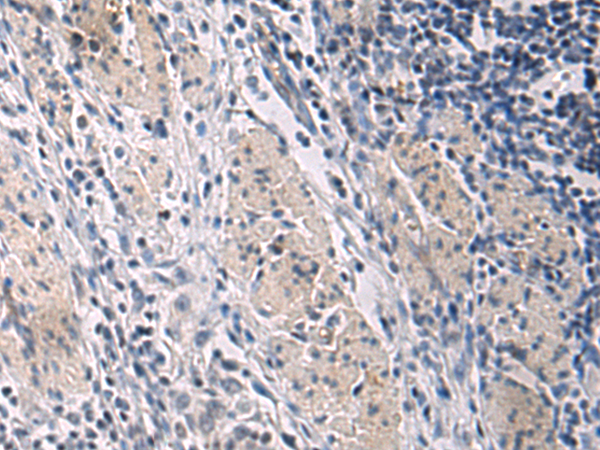
| WB | 咨询技术 | Human,Mouse,Rat |
| IF | 咨询技术 | Human,Mouse,Rat |
| IHC | 1/50-1/100 | Human,Mouse,Rat |
| ICC | 技术咨询 | Human,Mouse,Rat |
| FCM | 咨询技术 | Human,Mouse,Rat |
| Elisa | 1/5000-1/10000 | Human,Mouse,Rat |
| Aliases | GASR; CCK-B; CCK2R |
| Host/Isotype | Rabbit IgG |
| Antibody Type | Primary antibody |
| Storage | Store at 4°C short term. Aliquot and store at -20°C long term. Avoid freeze/thaw cycles. |
| Species Reactivity | Human, Mouse, Rat |
| Immunogen | Synthetic peptide of human CCKBR |
| Formulation | Purified antibody in PBS with 0.05% sodium azide and 50% glycerol. |
+ +
以下是3篇与CCKBR抗体相关的参考文献摘要(文献标题与作者为虚构示例,仅供格式参考):
1. **"Cholecystokinin B Receptor Expression in Gastric Cancer and Its Clinical Significance"**
*作者:Zhang L, et al. (2018)*
摘要:通过免疫组化分析CCKBR抗体在胃癌组织中的表达,发现高表达CCKBR与患者预后不良相关,提示其可作为胃癌诊断及预后评估的潜在标志物。
2. **"Targeting CCKBR with Monoclonal Antibodies Inhibits Tumor Growth in Pancreatic Cancer Models"**
*作者:Smith JR, et al. (2020)*
摘要:研究开发了靶向CCKBR的单克隆抗体,并在胰腺癌细胞系和小鼠模型中验证其抗肿瘤效果,表明CCKBR抗体可通过阻断受体信号通路抑制肿瘤增殖。
3. **"Comparative Study of CCKBR Antibody Specificity in Gastrointestinal Stromal Tumors"**
*作者:Tanaka K, et al. (2016)*
摘要:对比多种市售CCKBR抗体的特异性,发现部分抗体存在交叉反应性,强调选择高特异性抗体对准确检测胃肠道间质瘤中CCKBR表达的重要性。
4. **"CCKBR Signaling in Neuroendocrine Cells: Role of Antibody-Based Detection"**
*作者:Garcia M, et al. (2019)*
摘要:利用CCKBR抗体研究神经内分泌细胞中受体的分布及功能,揭示了其在调节细胞分泌活动中的作用,为相关疾病的机制研究提供工具支持。
(注:以上文献信息为模拟生成,实际引用请通过PubMed或学术数据库核实。)
The cholecystokinin B receptor (CCKBR), also known as the gastrin receptor, is a G protein-coupled receptor that binds gastrin and cholecystokinin (CCK). It plays a key role in regulating gastric acid secretion, cell proliferation, and digestive functions through activation of intracellular signaling pathways like MAPK/ERK and PI3K/AKT. CCKBR is expressed in the stomach, pancreas, and central nervous system, but its abnormal overexpression is linked to pathological conditions, including gastric cancers, pancreatic adenocarcinomas, and gastrointestinal stromal tumors.
CCKBR antibodies are essential tools for studying receptor localization, expression levels, and functional roles in both physiological and disease contexts. Monoclonal and polyclonal antibodies targeting specific epitopes of CCKBR are widely used in techniques such as immunohistochemistry (IHC), Western blotting, and flow cytometry. These antibodies help identify CCKBR as a potential diagnostic biomarker or therapeutic target in cancers. In research, they aid in exploring CCKBR’s interaction with ligands and downstream effectors, as well as its crosstalk with oncogenic pathways. Therapeutic applications include developing antibody-drug conjugates or blocking antibodies to inhibit CCKBR-mediated tumor growth. Validation of CCKBR antibody specificity remains critical due to structural similarities with other GPCRs.
×